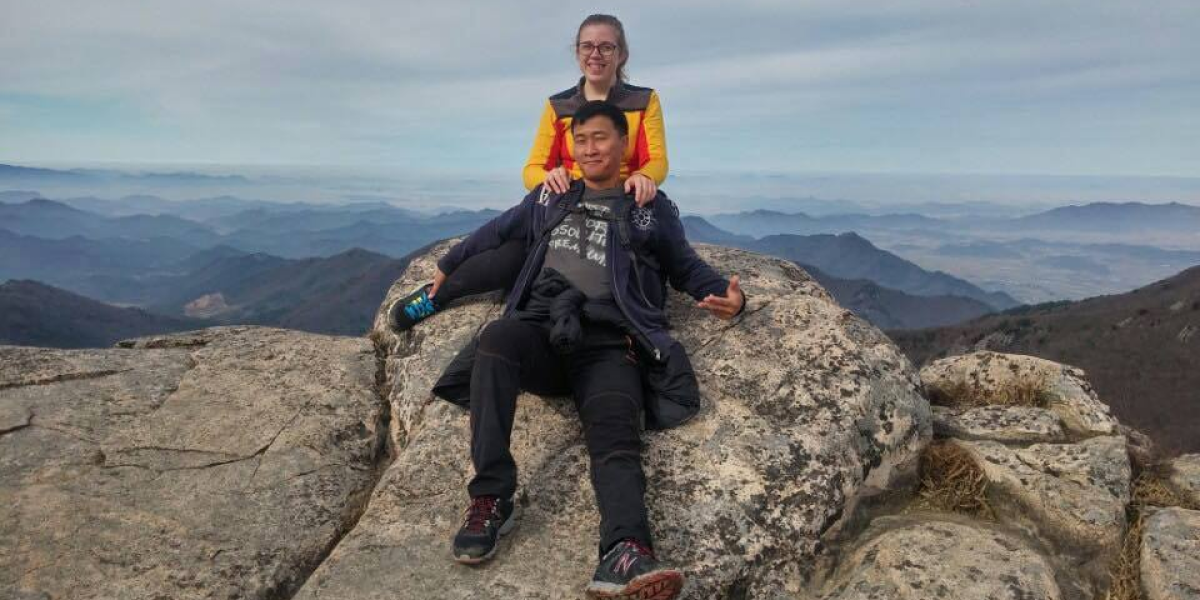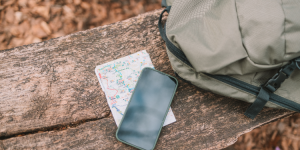
We move from one place to another for all different reasons. For Keri the journey abroad started off as a teenage adventure. Her love for K-pop took her all the way to South Korea — where she met her other big love, her husband. Keri misses home in America, but cannot yet bid farewell to the South Korean lifestyle, the culture of kindness and respect, and the spicy food. She talks to Expat.com about the country of temples, mighty mountains, and friendly people.
Hello Keri, where are you from, and what brought you to South Korea?
Hi, I am from Ohio, United States. I moved to South Korea in February 2013 for a job with the TaLK Program. I was teaching elementary English in after school classes for three years. Currently, I am teaching English at four different middle schools. Before Korea, I was a full-time manager at McDonald's and was also attending school. I graduated with a Korean major and English minor in December 2012, and straight after I came to Korea.
When I was in high school, I fell in love with a Korean band named DBSK, and I got into Korean pop music (K-pop). I decided that I wanted to go to Korea, and be there forever. I am finishing my fourth year here, and plan to be here for at least 10 more years before moving back to America with my husband.
What is the process for an American citizen to move to South Korea?
It is very easy in most cases. We have 90 days visa free to visit Korea. If you get a job here, they will sponsor your E-2 visa, and you receive a special Alien Registration Card with your foreigner number. There are other visas from A to G depending on your status. I am currently F-6 because I am married to a Korean. The sponsored student and teaching visas are easier to obtain.
What is your favourite thing and least favourite about South Korea?
My favorite thing is the kindness of the people. Korea is a very safe and trustworthy country. People will do what they can to help you, and always try to keep the jung — a tyadvepe of a bond.
My least favorite thing is the hierarchy. If someone is above you in age or status, they hold the power and the last say. You are expected to respect them, and it can lead to annoyance, anger, or situations where you feel helpless. Korean language has words for those above. They take it personally if you do not give respect, which is hard for me as a foreigner, because I feel respect is earned, not automatically given.

How would you describe South Korea in one sentence?
Through the good and bad parts, no matter where I go, Korea will always hold a large part of my heart and will always be my second home.
What has surprised you the most about South Korea?
Everything here is so modern, even in the countryside. If you look at Korea's history, they were wrecked from the Korean war just 60 years ago. But nowadays, you can get anything and everything at the push of a button, and their Wi-Fi is super fast.
What are the features of today's expat job market in South Korea?
Most expat jobs are in teaching English. The pay is good and they offer free housing. You work from 15 to 22 hours a week, but at public schools you desk-warm, so it sums to 40 hours. You have health insurance, which is taken from your pay, and pay into a pension that you can get back when you leave the country (unless you're from the UK. Sorry!)
How is accommodation in South Korea, and what type is available for expats?
It's usually one-room-apartments or studios. It is difficult to get anything else as an expat, if you look on your own. The housing market in Korea is ridiculously inflated — one of the biggest downsides.
What are the year's biggest holidays, and what is some essential etiquette?
There is Seolnal (Lunar New Year) in winter and Chuseok (Thanksgiving) in fall. But smaller holidays are celebrated too.
You always have to be respectful. Bowing, saying hello, shaking hands with two hands, no shoes in the house, always refilling soju shots for elders and giving up your bus seat. It's very easy if you are mindful of those around you.
How do you find the lifestyle in South Korea?
Koreans live in a bballi bballi mindset. Everything must be done quickly. You have a problem? It will be solved in a few days. Packages get to you in one or two days. Your food comes fast. Everything is expected quickly and done well. Koreans are also very into brands, and that isn't something I enjoy. Everyone must have a new car, a new phone, a new coat — it's very polarizing.
How is the transportation system in South Korea?
It's easy to get to your destination. I live in the countryside, and there's no subway here, but there are buses everywhere around our province, and we can get to a major hub in just one and a half hours. In more rural areas though, the bus comes once an hour.
Have you been able to adapt to the South Korean society?
Yes, I think so. Korean friends and my husband, who gives me an insight of the way Koreans think and behave, helped a lot.

How is the everyday life for you in South Korea?
It's good! I go to school, come home, and make a Korean dinner, go to the gym, study Korean or something else. It's just like living at home!
What do you do in your free time?
I read books, study Korean, and I am writing a novel. In the new year, I plan to take ballet or Japanese classes, but can't decide which. I also practice cooking and meet my friends when I can!
What new habits have you developed in South Korea and what old habits have you quit?
I could not cook before I came here, and now I cook Korean food every night! I learned to fend for myself for sure. I was a little immature when I arrived, but now I feel more of an adult. From my old habits, I stopped eating as much meat. It's so expensive here! I also stopped drinking so much. Koreans can drink a lot, and it was bad for me to try to keep up.
What is your opinion on the cost of living in South Korea?
The cost of living is really great. Some things are expensive (meat, fruit, gas) but other things are definitely not (phones, electric bills, vegetables.) It is really easy to save a ton of money here and still have money for all your needs and travel. I currently save half of my paycheck a month, and still live well.
You live in the Jeollanam-do province. How is the lifestyle different to the lifestyle of the big city?
Definitely different. We have almost no big marts or things from home. No Starbucks, no foreign food at all. Nobody speaks English here, and you will get stared at because they do not see too many foreigners. But everyone is friendly and helpful as if you are their own. People will try to speak English, and be generally kind and thoughtful. It's quieter but more tight-knit, and I really enjoy it.
What is something that you would like to do in South Korea, but haven't had the opportunity to do yet?
I want to hike Jirisan and Hallasan mountains.
Could you share your most memorable experience in South Korea?
On my first day of school in March, I tried to walk to my rural school because it did not seem too far. Turns out it was over 10 km away from my house! So I'm halfway there when someone pulls over to the side in front of me. He spoke no English but drove me to my school. When I got to school, my new co-teacher was laughing, and told me the kids saw me walking on the street and were all very excited to meet me. That was my first experience with the kindness of the Korean people but definitely not the last.

If you could do the move to South Korea over, what would you do differently?
I would try to get closer to the Korean people. A lot of people in Korea are shy about their English but are secretly good at it! Koreans have a tendency to try to save face. If it is not up to high standards, they just don't do it. I want to try harder to make Korean friends. It is really easy to fall into a pattern of only meeting foreigners and staying with what you know, but it's a great idea to branch out.
What do you think of the local cuisine? What are your favourite dishes?
I love Korean food, I eat it all the time! It's spicy but you get used to it. My favorite food is kimchi soup (kimchi jjigae) but I also love pork cutlet and the fried fish.
What do you miss the most about your home country?
My family. Being away from them grows harder by the year. People will ask me to tell them about America and I will. That's when the homesickness hits me the most.
Have you had a moment that you almost felt like leaving?
In October of 2015 my mom was diagnosed with Hodgkin's Lymphoma. Being so far away from her and unable to care or help was devastating. I went back to visit in the summer, and I went to an appointment with her. All the doctors knew me by name and had heard stories about me. I almost stayed in America and quit my job. But my mom pushed me to go back to my job and my husband, so I did, and luckily today she is cancer free.
Could you give us some useful tips that soon-to-expatriates in South Korea will benefit from?
Try to learn some Korean and to get emmersed in it. The culture is different, and there will be things you love and things you hate, but don't let the hate consume you. It's really easy to just be angry at the differences. Many people don't speak English and that's okay. It isn't their duty to cater to you.
If you had to advise an expat on what to bring with them in South Korea, what would you say?
Gifts for co-workers from your home. It'll start the relationship off well. Koreans love chocolate and coffee! Large towels. Koreans only use small hand towels as bath towels. If you are bigger than a size 8 US, bring shoes. Your favorite food. A credit card with no foreign transaction fees.
What are your plans for the future?
I am going to stay in Korea for at least ten years, and then move back to America with my husband. I am going to grad school in two years for an English degree to try and get a job away from teaching, as I also speak Korean. I am also thinking of getting another master's to help me for the move back home.
What is one thing that you will take with you from South Korea?
The kindness I learned from the people. I always try to go out of my way to help people and to think of others before myself. I think it's a great lesson to learn, and has made me a better person. And bowing at people. I'll never forget that.



















